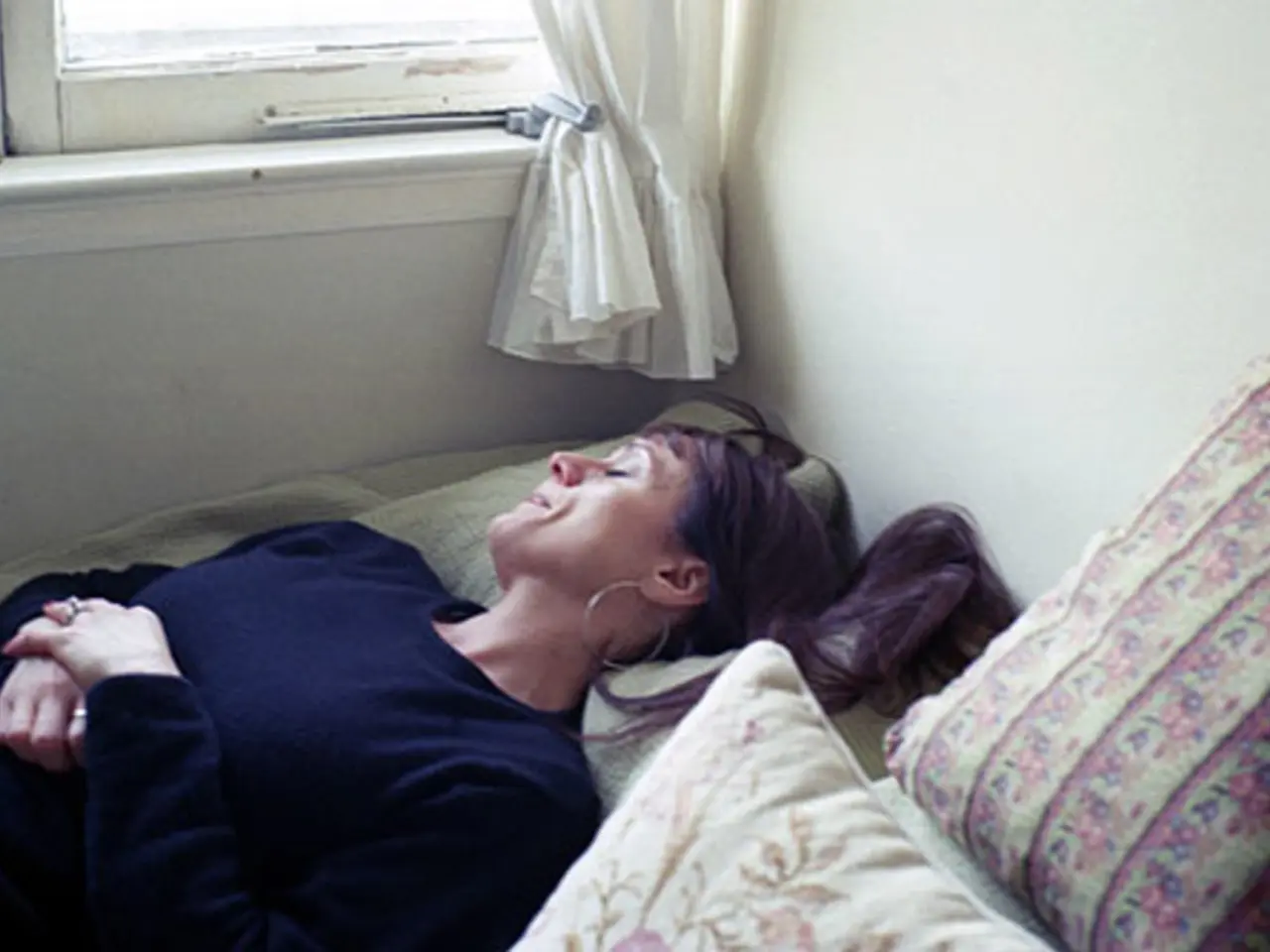Sleeping through the years
Strategies for Snoozing Successfully in Senior Years
As we grow older, we may notice changes in our sleep patterns, such as feeling tired earlier in the evening, waking up early, or not getting as restful of sleep. However, consistently waking up tired, having insomnia, or other sleep problems are not a normal part of aging.
A good night's sleep is vital for both our physical and emotional health, regardless of age. Quality sleep improves focus, boosts memory, allows our bodies to repair themselves, and helps our immune system function properly. If you're an older adult with disturbed sleep, you're more likely to experience emotional issues, memory problems, excessive daytime sleepiness, and an increased risk for falls. Inadequate sleep can also lead to serious health problems like heart disease, diabetes, weight problems, and breast cancer in women.
Let's tackle sleep problems head-on and get a great night's sleep to improve the quality of your waking life!
How much sleep do older adults need?
Healthy adults typically require 7 to 9 hours of sleep every night. However, what truly matters is how you feel in the morning. If you're frequently waking up not feeling rested or struggling with sleepiness during the day, it’s important to find ways to enhance your sleep quality.
Aging and sleep changes
With age, our bodies produce fewer growth hormones, which leads to reduced levels of deep sleep, known as the most refreshing part of the sleep cycle. Consequently, melatonin production decreases, causing more fragmented sleep with frequent awakenings during the night. This is often why we grow accustomed to being "light sleepers" as we age. Other age-related changes may include:
- Going to bed earlier and waking up earlier.
- Requiring longer time in bed to get the necessary hours of sleep.
- Making up for the shortage by taking naps during the day.
Most of these changes are normal and don't indicate a sleep problem.
Sleep problems unrelated to age
Everyone experiences occasional sleep problems, but recurring symptoms of insomnia could be a sign of a sleep disorder. Regularly experience any of the following?
- Difficulty falling asleep despite feeling tired.
- Trouble getting back to sleep after being awakened.
- Not feeling refreshed upon waking.
- Sleepiness during the day.
- Difficulty focusing during the day.
- Reliance on sleep medications or alcohol to fall asleep.
- Emotional instability.
Speak with a Licensed Therapist
Whether you're dealing with depression, anxiety, relationships, or other issues, BetterHelp can help you connect with an accredited therapist to help get your life back on track.
Causes of insomnia in older adults
Sleep disorders in older adults are often linked to underlying factors. By recognizing and tackling these underlying issues, you can develop a personalized approach to improve your sleep and overall well-being.
- Are you currently experiencing a lot of stress?
- Suffering from symptoms of depression or feeling emotionally flat?
- Struggle with chronic anxiety or worry?
- Recently experienced a traumatic event?
- Taking medications that might impact your sleep?
- Dealing with any health problems that could affect sleep?
Common causes of sleep problems in older adults
- Neglecting good sleep habits and sleep environments.
- Dealing with pain or existing health conditions.
- Going through menopause or post-menopause and experiencing hot flashes or night sweats.
- The combination of multiple medications and their side effects can impair sleep.
- Lack of physical activity.
- Emotional stressors, such as retirement, the loss of a loved one, or moving from your home.
- Lack of social engagement.
- Sleep disorders such as Restless Legs Syndrome (RLS) or sleep-disordered breathing (like snoring or sleep apnea).
- Lack of sunlight exposure.
Tips for improving sleep as we age
By finding solutions for emotional issues, improving sleep environments, and making healthier daytime choices, you can improve your sleep quality. Keep in mind that everyone is different, so it may take experimentation to find strategies that work best for you.
Improve your sleep environment
- Increase melatonin production naturally by minimizing artificial lights at night. Use low-wattage bulbs where possible, turn off the TV and computer at least an hour before bedtime, and avoid reading from backlit devices (such as tablets) in the hours leading up to sleep.
- Create a comfortable, quiet, and cool bedroom environment. Buy earplugs or use a white-noise machine to block out sound, use a sleep mask to create darkness, and adjust the temperature to suit your personal preference.
- Make sure your bed is comfortable. Experiment with different pillows, toppers, or consider a new mattress to best support your sleeping position. Opt for an adjustable base for overall comfort, relief from sleep apnea, and reduced back pain as you age.
- Use your bedroom only for sleep and intimacy. Prevent the habits of working, watching TV, or using a computer in bed to help your brain associate the bedroom with sleep.
- Move bedroom clocks out of view to eliminate the distraction of keeping track of the time.
Keep a regular bedtime routine
- Maintain a consistent sleep schedule. Go to bed and wake up around the same time every day, even on weekends.
- Address snoring with earplugs, a white-noise machine, or separate bedrooms.
- Gradually adjust your bedtime to match when you naturally feel tired, even if it’s earlier than usual.
- Develop soothing bedtime rituals, such as taking a bath, playing soft music, or practicing relaxation techniques like progressive muscle relaxation, mindfulness meditation, or deep breathing.
- Limit the use of sleep aids and sleeping pills, as they have side effects and are not intended for long-term use.
- Try combining sex and sleep for a relaxing sleeping experience.
Learn how to nap effectively
If you find it difficult to stay alert during the day, a nap may give you the energy boost you need. Experiment to see if napping helps you.
- Keep naps short, ideally less than an hour, and no longer than 15-45 minutes.
- Take naps early in the afternoon to avoid disrupting your nighttime sleep.
- Choose a relaxing, quiet environment with limited light and noise for napping.
Optimize your diet for better sleep
Adopt a sleep-friendly diet during the day and be mindful of the impact of what you eat and drink in the hours leading up to sleep.
- Limit caffeine intake later in the day to avoid disrupting sleep.
- Avoid alcohol before bedtime, as it may induce sleep initially but can later lead to disrupted sleep.
- Eat a light snack a few hours before bedtime, such as low-sugar cereals, yogurt, or warm milk.
- Minimize sugar, refined carbs, and spicy foods before bedtime to reduce the chances of indigestion or wakefulness.
- Limit your fluid intake before sleep to minimize frequent bathroom breaks at night.
Exercise for better sleep
Regular exercise has numerous health benefits, including promoting more restful sleep. Find a suitable exercise routine given any mobility issues you may have and always consult your doctor before embarking on a new fitness program.
- Swimming or water exercises are gentle ways to build up fitness and are great for sore joints or weak muscles.
- Dancing, taking a dance class, or participating in a group fitness activity is a fun way to stay active and engage socially.
- Outdoor activities like lawn bowling, bocce, or pétanque provide a low-impact exercise experience.
- Golfing is another low-impact exercise option that can be done with friends for added enjoyment.
- If you're up for more vigorous exercise, running or cycling can be done outdoors or on a stationary bike or treadmill.
Aerobic exercise for seniors
A study conducted at Northwestern University found that aerobic exercise resulted in the most significant improvement in sleep quality, including sleep duration, for middle-aged and older adults with insomnia[1]. Participants exercised for two 20-minute sessions or one 30-40-minute session four times per week at 75 percent of their maximum heart rate on at least two activities, such as walking or using a stationary bike or treadmill. Their sleep quality improved dramatically, with fewer depressive symptoms, more vitality, and less daytime sleepiness reported[1].
Source: National Sleep Foundation
Reduce mental stress
High levels of stress and anxiety built up during the day can impact sleep at night. Learn how to let go of thoughts and worries when it's time to sleep.
- Keep a journal to write down worries before bedtime.
- Make a to-do list, check off completed tasks, and plan goals for the next day to help put things in perspective.
- Listen to calming music.
- Read a book that helps you relax.
- Have a friend or partner give you a massage.
- Practice relaxation techniques to prepare your body for sleep, such as deep breathing or meditation.
- Seek opportunities during the day to talk about what's troubling you with a friend, family member, or therapist.
Returning to sleep when waking during the night
As you grow older, it's common to wake up more often during the night. However, if you have difficulty falling back asleep, the following tips may help:
- Don't stress about the inability to sleep, as this only fuels the anxiety and keeps your body awake. Focus on the feelings and sensations in your body instead.
- Make relaxation your goal, not sleep, by practicing deep breathing or meditation without getting out of bed.
- Do a quiet, non-stimulating activity if you’ve been awake for more than 20 minutes, such as reading a book, meditating, or practicing relaxation techniques. Keep lights dim and avoid screens.
- Postpone worrying about daily concerns. Write them down on a piece of paper to address them when you wake up the next day.
When to consult a doctor about sleep problems
If your self-help efforts are unsuccessful, it's a good idea to keep a sleep diary and share it with your doctor. Include details on caffeine, alcohol, and nicotine consumption, medication use, exercise routine, lifestyle changes, stressors, and sleep patterns to help them better understand your sleep issues[1]. Your doctor may then refer you to a sleep specialist or cognitive behavioral therapist for further treatment, especially if insomnia is taking a toll on your mood and health.
References:[1] National Sleep Foundation. (2021). Aerobic exercise improves sleep and mood for insomniacs. Retrieved April 3, 2022, from https://www.sleepfoundation.org/press-release/aerobic-exercise-improves-sleep-and-mood-insomniacs[2] Ruehr S, Avidan AY. Sleep disorders in older adults. Internal Medicine Reviews, 2015; 47(3): 335–350.[3] Lee-Knight R, Crews BC, Ferris SD. An age-diverse approach to understanding and designing for sleep in older adults: An integrative review. Frontiers in Psychology, 2020; 11: 2054.[4] Monteleone P, Pollo A, Logroscino G, Arandia E, Vanaja A, and Wright KP. Evidence-based psychological interventions for depression, anxiety, and excessive worry in late life: A systematic review. Psychology and Aging, 2013; 28(4): 685–701.[5] Huang M-S, Bilun Y, Kwok T-W, Ng S-L, Wong W-M, Wilson KP, et al. The relationship between sleep problems and emotional symptoms in older adults: Results from a population-based study. Journal of Aging and Health, 2016; 34(8): 1115–1133.
Sleep disruptions in older adults can be a sign of an underlying issue, such as stress, depression, anxiety, or taking medications that might impact sleep. Regularly experiencing difficulties falling asleep, staying asleep, or feeling unrefreshed upon waking can indicate a sleep disorder. If you're an older adult experiencing sleep problems, focusing on improving mental health through therapy and managing stressors, as well as prioritizing a healthy diet, exercise, and sleep environment can aid in achieving a good night's sleep. By adopting these strategies, you can improve your sleep quality and overall well-being, leading to better physical and emotional health.








